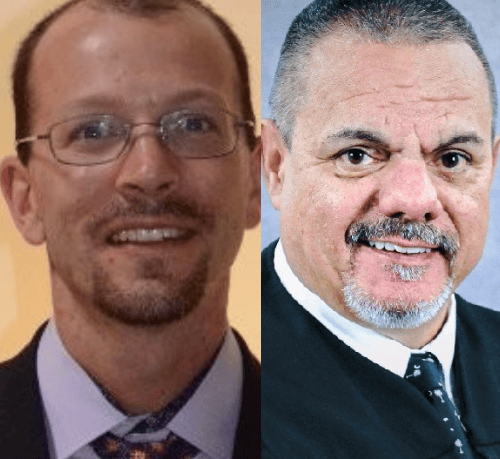The Health Risks of Dr. Jason Boyle's 120-Hour Hunger Strike Against Judge Singleton's Ban on Free Speech
OCONEE PROBATE COURTOCONEE COUNTY JAIL


There are allegations that Judge Singleton might have instructed his associates at the Sheriff’s Department to subject Dr. Boyle to harsh and punitive treatment. The conditions of Boyle's confinement, including his solitary confinement and the timing of his limited outside time, suggest a deliberate attempt to isolate and punish him beyond what is customary for such infractions.
Seneca, SC – Dr. Jason Boyle, a noted First Amendment auditor, has been on a hunger strike for more than 120 days since his incarceration by Judge Danny Singleton on the early morning of May 29, 2024. According to close family members, Dr. Boyle had his last meal on May 28, 2024. His arrest followed a controversial directive from Judge Singleton, offering him the stark choice of deleting a video recorded in the probate court lobby or facing jail.
The Incarceration of Dr. Jason Boyle
Dr. Boyle, who is known for his activism and rigorous defense of First Amendment rights, was arrested after recording his interactions with the probate court clerk. This video documentation was part of his efforts to highlight transparency and accountability within public institutions. However, Judge Singleton, citing a breach of court rules, demanded that Boyle delete the footage. When Boyle refused, asserting his constitutional rights, Singleton ordered his incarceration.
The Start of the Hunger Strike
Determined to stand by his principles, Dr. Boyle began his hunger strike immediately upon his imprisonment. His protest aims to draw attention to what he perceives as judicial corruption and the violation of his rights. Close family members report that Boyle has steadfastly refused food since May 18, 2024, demonstrating his commitment to this cause despite the significant risk to his health.
Solitary Confinement Under Suspicious Conditions
In a troubling development, Dr. Boyle has been subjected to solitary confinement under questionable circumstances. He is only allowed out of his cell at 1:00 AM, when the prison is largely inactive. During his last phone call to a family member at 1:18 AM, Boyle revealed that he is permitted out of solitary confinement in the middle of the night when everyone else is asleep. During this call, Boyle sounded sick, weak, and extremely cold. The hunger strike has taken a severe toll on his health, and he stated that he will not eat for the duration of his incarceration. This raises serious concerns about his treatment and the conditions of his confinement.
There appears to be no legitimate ground for Boyle’s solitary confinement. According to sources, the prison warden ordered him to remove his engagement ring while other prisoners were allowed to keep their wedding rings. Boyle's refusal to remove his ring led to his immediate placement in solitary confinement, despite the absence of any aggressive behavior or rule violations on his part.
Allegations of Torture and Misconduct Instigated by Judge Danny Singleton
There are allegations that Judge Singleton might have instructed his associates at the Sheriff’s Department to subject Dr. Boyle to harsh and punitive treatment. The conditions of Boyle's confinement, including his solitary confinement and the timing of his limited outside time, suggest a deliberate attempt to isolate and punish him beyond what is customary for such infractions.
Family's Perspective
Dr. Boyle’s family is deeply concerned about his well-being. They emphasize that his hunger strike and the harsh conditions of his confinement are a direct response to the injustice he feels has been inflicted upon him by Judge Singleton. "Jason is not just fighting for his own rights," a family member stated. "He is standing up against a corrupt system that punishes individuals for exercising their constitutional freedoms." Family members are extremely worried about his deteriorating health and fear for his life as he remains resolute in his decision not to eat during his incarceration.
Singleton's Repressive Measures
Judge Singleton’s directive to delete the video and subsequent order to jail Dr. Boyle have been widely criticized as repressive measures aimed at silencing dissent. Singleton's actions appear to be part of a broader pattern of using judicial power to intimidate and control those who challenge his authority. This incident follows a series of contentious rulings and actions by Singleton that have raised serious questions about his conduct and the fairness of his courtroom.
Immediate Health Concerns
1. Dehydration
While it is unclear whether Dr. Boyle is also abstaining from liquids, dehydration is a critical concern. The human body can only survive for a few days without water. Signs of dehydration include dizziness, weakness, confusion, and fainting. Severe dehydration can lead to kidney failure, seizures, and shock, which are life-threatening conditions.
2. Hypoglycemia
The lack of food intake can lead to dangerously low blood sugar levels. Hypoglycemia can cause symptoms such as sweating, shaking, confusion, irritability, and in severe cases, loss of consciousness or seizures. The brain relies heavily on glucose, and prolonged deprivation can lead to cognitive impairments and neurological damage.
Short-Term Effects (Within the First Few Days)
1. Electrolyte Imbalance
Prolonged fasting disrupts the balance of essential electrolytes, such as sodium, potassium, and magnesium. Electrolyte imbalances can cause cardiac arrhythmias, muscle weakness, and neurological disturbances. Severe imbalances can result in cardiac arrest.
2. Muscle Wasting
As the body exhausts its glucose stores, it begins to break down muscle tissue to produce energy. This process, known as catabolism, leads to muscle wasting and weakness. In extreme cases, the breakdown of muscle proteins can lead to rhabdomyolysis, a condition where muscle fibers enter the bloodstream, potentially causing kidney damage.
Mid-Term Effects (After Several Days to Weeks)
1. Nutritional Deficiencies
A prolonged hunger strike results in deficiencies of essential vitamins and minerals, including vitamin B12, iron, calcium, and folate. These deficiencies can lead to anemia, weakened immune function, and impaired wound healing. Long-term deficiencies can cause irreversible damage to vital organs.
2. Immune System Suppression
Malnutrition severely weakens the immune system, making the body more susceptible to infections. Given the confined conditions of incarceration, Dr. Boyle is at an increased risk of contracting and suffering from infections that his weakened body might struggle to fight off.
Long-Term Effects (If Prolonged Further)
1. Organ Failure
Prolonged starvation can lead to the failure of critical organs, including the heart, liver, and kidneys. The body’s metabolism slows down to conserve energy, but eventually, the organs begin to fail due to the lack of essential nutrients.
2. Neurological Damage
Continued lack of nutrition can lead to permanent neurological damage. The brain requires a constant supply of nutrients to function correctly. Extended deprivation can cause irreversible cognitive deficits, motor dysfunction, and other neurological impairments.
Psychological Effects
1. Mental Health Decline
The psychological impact of prolonged hunger and solitary confinement can exacerbate feelings of anxiety, depression, and hopelessness. The stress of isolation and the physical weakness from starvation can lead to severe mental health deterioration.
Conclusion
Dr. Jason Boyle's 120-hour hunger strike poses significant and escalating risks to his health. The immediate effects, including dehydration and hypoglycemia, are already life-threatening. As the hunger strike continues, the risk of severe complications, such as electrolyte imbalances, muscle wasting, and organ failure, increases exponentially. The psychological toll of prolonged starvation and solitary confinement further exacerbates his vulnerable condition.
Urgent medical intervention is necessary to prevent permanent damage or fatality. Dr. Boyle’s commitment to his cause underscores the importance of addressing the grievances that have led to his extreme protest. It is crucial for judicial authorities and medical professionals to take immediate action to safeguard his health and well-being.
